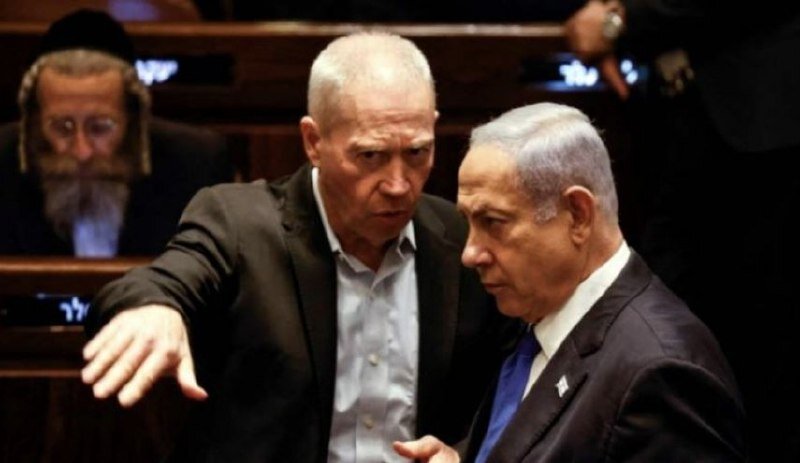Internal rifts growing over the Gaza war in Israel
Divisions in Netanyahu's war cabinet come to the surface as protesters voice anger over handling the war

TEHRAN- Public cracks have emerged among the Israeli war cabinet over the war on Gaza, as Netanyahu's popularity plummets to record lows with protesters rallying in Tel Aviv against the regime's prime minister Benjamin Netanyahu.
Divisions among the Israeli war cabinet assembled by Netanyahu after the 7 October al-Aqsa Storm Operation by Hamas have grown in the public eye.
Reports suggest the internal rifts among the Israeli war cabinet go beyond the regime's strategy in its war on Gaza.
The Financial Times says Netanyahu and his war minister Yoav Gallant are barely on speaking terms anymore.
With the regime's war on Gaza entering its fourth month, minister Gadi Eisenkot, whose son was killed by the Palestinian resistance whilst fighting in the enclave, has accused Netanyahu and his ministers of not being transparent to the Israeli public over developments in the war.
Eisenkot has called for snap elections telling the regime's Channel 12 that "those who talk about an absolute defeat (of Hamas) and lack of will and ability do not tell the truth. This is why there is no need to tell tall tales."
The regime has withdrawn many of its troops from northern Gaza despite the Palestinian resistance still active in the north of the enclave.
Eisenkot said, "A strategic achievement was not reached … We did not demolish the Hamas organization (in the north)."
During the TV interview, he emphasized that the regime needs fresh elections, citing the lack of public trust in Netanyahu’s leadership.
"We need to go to the polls and have an election in the next few months, in order to renew the trust as currently there is no trust."
In a bid to display unity in the aftermath of the al-Aqsa Storm Operation, Netanyahu formed a war cabinet.
But this "does not disguise the fact that there are already major differences in policy and approach," Yohanan Plesner, the president of an Israeli Institute in occupied al-Quds (Jerusalem), told CNN. Plesner added that these divisions are now surfacing.
Reuven Hazan, a political scientist at the Hebrew University in occupied al-Quds, also told the broadcaster that "the lines between the two (Israeli political) camps are getting worse and worse every day".
Further exposing the deepening splits, Eisenkot said the remaining Israeli captives held by the Palestinian resistance "will only return alive if there is a deal, linked to a significant pause in fighting".
He said claims by Netanyahu and his closest ministers that the captives could be freed through military actions are just intended "to spread illusions".
Thousands of Israelis flooded Tel Aviv to protest against Netanyahu's government, accusing the Israeli leader of mishandling security and calling for a new election.
Anti-government protests that shook the regime for much of 2023 ceased after the 7 October attacks.
Political rifts were set aside as Israelis rallied behind the military and the families of those killed or taken captive.
But with the devastating war in Gaza dragging on to its fourth month without any signs of an Israeli victory, calls for leadership changes are growing stronger.
This was reflected in Saturday night's demonstrations in Tel Aviv square where many of last year's anti-government protests took place.
"The government that abandoned us on October 7 continues to abandon us every day since - those (settlers) evacuated from the northern and southern (fronts), the families of the victims, the reservists, the hostages," said Noam Alon, whose brother, a soldier, was killed in Gaza, told Reuters.
"The power is in our hands to change and repair," she said from the stage. "This government needs to go home. Now!"
As divisions emerge among members of Netanyahu's wartime cabinet, the prime minister is intent on staying in power, knowing an end to the war would be the beginning of his time in prison.
A new survey shows only 15% of Israelis want Netanyahu to stay in power after the regime's war on Gaza ends.
In the poll conducted by an Israeli Institute, 56% of those questioned said continuing the military offensive was the best way to recover the captives, while 24% thought a swap deal including the release of Palestinian prisoners from Israel's jails would be best.
But only 15% want Netanyahu to be prime minister, the poll showed. His political rival and present war cabinet partner, Benny Gantz, garnered support from 23% of those surveyed. Around 30% named no preferred leader.
Netanyahu said on Saturday it would be months before victory is achieved, yet successive surveys have found his popularity has fallen sharply since the surprise October Hamas operation.
The prime minister promised to crush Hamas and the Palestinian resistance on 7 October, something that appears to be an impossible task, as the evidence on the ground in Gaza indicates.
The Israeli military has left much of Gaza's civilian infrastructure to rubble after months of indiscriminate airstrikes and ground offensives, yet the prowess of the Palestinian resistance appears to be still unharmed.
The United Nation's secretary general, Antonio Guterres, has strongly condemned the Israeli regime for the "heartbreaking" killings of Palestinian civilians in Gaza.
The "Israeli military operations have spread mass destruction and killed civilians on a scale unprecedented during my time as secretary-general," Guterres said at the opening of a summit of the G77+China in Kampala, the Ugandan capital.
“This is heartbreaking and utterly unacceptable," he noted.
Leave a Comment